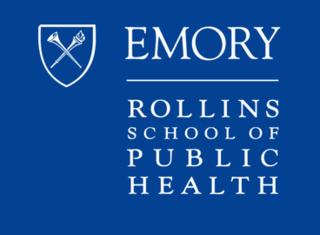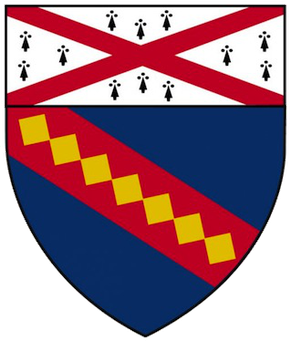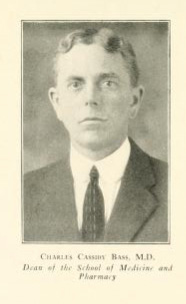
Tulane University, officially the Tulane University of Louisiana, is a private research university in New Orleans, Louisiana. Founded as the Medical College of Louisiana in 1834 by seven young medical doctors, it was turned into a comprehensive public university as the University of Louisiana by the state legislature in 1847. The institution became private under the endowments of Paul Tulane and Josephine Louise Newcomb in 1884 and 1887. The Tulane University Law School and Tulane University Medical School are, respectively, the 12th oldest law school and 15th oldest medical school in the United States. Tulane has been a member of the Association of American Universities since 1958 and is classified among "R1: Doctoral Universities – Very high research activity".

The Tulane University School of Medicine is located in New Orleans, Louisiana, United States and is a part of Tulane University. The school is located in the Medical District of the New Orleans Central Business District.

The Rollins School of Public Health (RSPH) is the public health school of Emory University. Founded in 1990, Rollins has more than 1,100 students pursuing master's degrees (MPH/MSPH) and over 150 students pursuing doctorate degrees (PhD). The school comprises six departments: Behavioral, Social, and Health Education Sciences (BSHES), Biostatistics (BIOS), Environmental Health (EH), Epidemiology (EPI), Global Health (GH), and Health Policy and Management (HPM), as well as an Executive MPH program (EMPH).

Tropical medicine is an interdisciplinary branch of medicine that deals with health issues that occur uniquely, are more widespread, or are more difficult to control in tropical and subtropical regions.

The Yale School of Public Health (YSPH) was founded in 1915 by Charles-Edward Amory Winslow and is one of the oldest public health masters programs in the United States. It is consistently rated among the best schools of public health in the country, receiving recent rankings of 3rd for its doctoral program in epidemiology. YSPH is both a department within the school of medicine as well as an independent, CEPH-certified school of public health.
The School of Public Health is one of 17 schools at the University of Pittsburgh. The school, founded in 1948, was first led by Thomas Parran, surgeon general of the U.S. Public Health Service. It is ranked as the 13th best public health school in the United States by U.S. News & World Report. In addition, it is ranked third among public health schools for funding received from the National Institutes of Health. It was the first of only two fully accredited schools of public health in Pennsylvania. The school offers a Bachelor's of Science in Public Health (BSPH), Masters of Public Health (MPH), Master of Science (MS), Master of Health Administration, and doctoral degrees in areas such as behavioral and community health sciences, biostatistics, environmental and occupational health, epidemiology, health policy and management, human genetics, and infectious disease and microbiology.
The Joseph L. Mailman School of Public Health is the public health graduate school of Columbia University. Located on the Columbia University Medical Center campus in the Washington Heights neighborhood of Manhattan, New York City, the school is recognized by the Council on Education for Public Health.
The American Journal of Epidemiology (AJE) is a peer-reviewed journal for empirical research findings, opinion pieces, and methodological developments in the field of epidemiological research. The current editor-in-chief is Dr. Enrique Schisterman.

The CUNY Graduate School of Public Health & Health Policy is a public American research and professional college within the borders of City University of New York (CUNY) system of colleges. The school is situated at 55 West 125th Street in Manhattan. CUNY SPH offers doctoral programs, master's programs, several certificates, and faculty memberships in many of CUNY's research centers and institutes. A core roster of over 50 full-time faculty is supplemented by additional faculty members drawn from throughout CUNY.

The Iquitos Satellite Laboratory (IQTLAB) was established in 2002 in the city of Iquitos, Peru by doctor Margaret Kosek, biologist Maribel Paredes Olortegui, and nurse Pablo Peñataro Yori, with the collaboration of the Dr. Robert Gilman working group in Lima, Peru and the US Naval Medical Research Unit No. 6 (NAMRU-6).

The Milken Institute School of Public Health is the school of public health of the George Washington University, in Washington, DC. U.S. News & World Report University Rankings ranks the Milken SPH as the 11th best public health graduate program in the United States.
The University of Maryland School of Public Health is located in College Park, Maryland. U.S. News & World Report ranked the school 28th among all schools and programs of public health in 2023. It contains the departments of Department of Behavioral and Community Health, Department of Epidemiology and Biostatistics, Department of Family Science, Department of Health Policy and Management, Department of Kinesiology and Maryland Institute for Applied Environmental Health. It also includes the Herschel S. Horowitz Center for Health Literacy, the nation's first academic center focused on improving health literacy, the Maryland Center for Health Equity, which focuses on eliminating racial and ethnic health disparities, and the Prevention Research Center, a Centers for Disease Control and Prevention (CDC)-funded center focused on improving mental health and eliminating health disparities and related social injustices experienced by LGBTQ+ persons.

Charles Cassidy Bass was an American medical doctor and researcher on tropical medicine who made significant contributions to understanding malaria, hookworm, and other diseases. Later Bass studied the relationship between dental health and general well-being. Bass articulated and promoted the "Bass Technique of Toothbrushing" and developed improved means of flossing teeth, for which some refer to Bass as "The Father of Preventive Dentistry". He subsequently became a university administrator, serving as dean of the Tulane University School of Medicine, from 1922 to 1940.
Adetokunbo Oluwole Lucas was a Nigerian doctor who was considered a global leader in tropical diseases. Born in Lagos, he was educated in the United Kingdom and commenced his professional career in Nigeria. Lucas received the Prince Mahidol Award in 1999 for his support of strategic research on the tropical diseases. He served for ten years as the Director of Special Programmes for Research and Training in Tropical Diseases based at the World Health Organization in Geneva, Switzerland. He was Adjunct Professor of International Health Department of Global Health and Population of the Harvard School of Public Health. Lucas worked largely during his life time in his home nation of Nigeria and traveled frequently to the United Kingdom and to the Harvard School of Public Health in the United States.
Christopher Mores is an American (US) arbovirologist, trained in infectious disease epidemiology. He is a professor in the Department of Global Health at the Milken Institute School of Public Health, the program director for the Global Health Epidemiology and Disease Control MPH program, and is director of a high-containment research laboratory at the George Washington University in Washington, DC.
Paul Kieran Whelton is an Irish-born American physician and scientist who has contributed to the fields of hypertension and kidney disease epidemiology. He also mentored several public health leaders including the deans of the schools of public health at Johns Hopkins and Columbia. He currently serves as the Show Chwan Health Care System Endowed Chair in Global Public Health and a Clinical Professor in the Department of Epidemiology at the Tulane University School of Public Health and Tropical Medicine. He is the founding director of the Welch Center for Prevention, Epidemiology, and Clinical Research at Johns Hopkins University.
Elizabeth Terrell Hobgood "Terry" Fontham is an American cancer epidemiologist, public health researcher, and founding dean of the Louisiana State University Health Sciences Center New Orleans School of Public Health.

Camara Phyllis Jones is an American physician, epidemiologist, and anti-racism activist who specializes in the effects of racism and social inequalities on health. She is known for her work in defining institutional racism, personally mediated racism, and internalized racism in the context of modern U.S. race relations. During the COVID-19 pandemic, Jones drew attention to why racism and not race is a risk factor and called for actions to address structural racism.
Ana Victoria Diez-Roux is the dean of the Dornsife School of Public Health and Distinguished University Professor of epidemiology at Drexel University. Her research focuses on the social determinants of health, and the impacts of neighborhoods on health.
Maureen Yvette Lichtveld is an American epidemiologist. She is the dean at the University of Pittsburgh School of Public Health.












